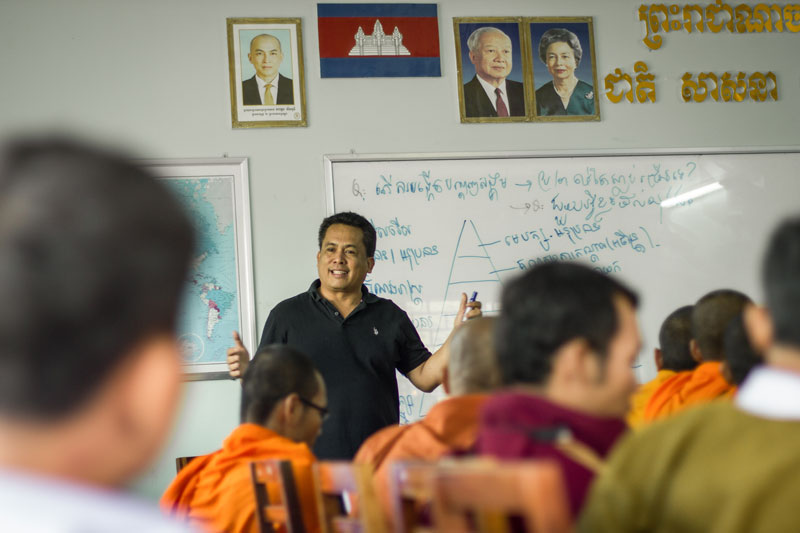BATTAMBANG CITY – Forging ahead with a nationwide tour that it insists does not belie an intention to form a new opposition party, Kem Ley’s “Khmer for Khmer” collective touched down at a small university here Sunday declaring a desire to be an incubator for grassroots political action.
A high-profile political commentator, Mr. Ley created the advocacy group in late October and has since been traveling the country, introducing his team of civil society leaders to small crowds drawn by his growing status as a renegade willing to pour scorn on both of the country’s major parties.

Mr. Ley says his team goes wherever it is invited, so long as the organizer can gather about 80 people—the critical mass he says is necessary for each of the community-run political parties he hopes Khmer for Khmer will spark.
“You probably know me already; I am Kem Ley, the social analyst,” he said at Dewey International University’s campus, where he arrived sporting nylon track pants and blood-red leather Nike Air Force One sneakers.
About 80 students and monks huddled in a small meeting room, with Mr. Ley’s unofficial deputy, Yang Saing Koma from the Cambodian Center for Study and Development in Agriculture, opening the floor to questions.
“We want the Cambodian people to hold their destiny in their own hands; we want political affairs to become a normal thing that is not an affair of leaders and politicians but it’s for general people,” Mr. Saing Koma said.
Many in the audience criticized the opposition CNRP, whose policies are governed by an unelected standing committee dominated by longtime opposition loyalists appointed when the party formed in July 2012.
A young monk stood to offer a quick sketch of recent Cambodian political history, bemoaning the lack of internal democracy in the country’s opposition parties.
“Sam Rainsy was with the Funcinpec party, and then he split to form his Khmer Nation Party, because he saw that Funcinpec had no democracy,” the monk told the room.
“After that, he created the Sam Rainsy Party, and then Kem Sokha saw that the Sam Rainsy Party also did not have democracy, so then he formed the Human Rights Party.
“Then we saw them join together into the CNRP,” the monk continued. “Now Khmer for Khmer forms as a party because it has been seen that the CNRP does not have real democracy.”
Mr. Ley stressed that he has no plans to create a political party of his own, before attempting to draw a distinction between himself and Cambodia’s current opposition leaders.
“I will not go to the places where there are large platforms and megaphones, because I just want to sit on a mat on the soil in village in order not to waste money,” Mr. Ley said.
“Some party leaders become so rich, meaning that they not only have money to do politics but they also have money to build villas, because they are professional politicians who have turned politics into a business,” he continued.
Mr. Ley then launched into a defense of his plans to help incubate commune-level micro-parties run by locals. Next year, he plans to help establish 25 of these micro-parties—in which he insists he will then play no direct role—as a pilot before the February 2017 commune elections.
“Where can we get the money for those who collect the people to form a party? I have already discussed this with a group of about 20 people,” Mr. Ley explained. “Most of them drink coffee, and they drink it twice a day for 1,500 riel.”
“If you have 80 people, you should instead drink only one glass of coffee a day if you want to do politics in your commune. Then if you each contribute about $1, you will have $80 and that’s enough to run a political party.”
Mr. Ley, who has been accused of harboring intentions to turn his network into his own party for the 2017 commune elections and the 2018 national election, said he is now set on expanding the pilot beyond just 25 communes.
“Our group will go to organize any commune that can form a party. If they say they can get 80 people to form a party, we will help them and discuss the legal procedures,” he said.
The event’s organizer, Meas Nee, from the Battambang-based Village Focus Cambodia NGO, said he believed in Mr. Ley’s vision for Khmer for Khmer.
“[People] always think that this group comes to gather forces so that they can vote for Kem Ley one day, but it’s not like that,” Mr. Nee said.
“We just want to help the people to do some small things in line with democratic principles, and to say, ‘If you don’t solve this problem, we will not vote for you, Mr. Commune Chief. If you are not re-elected, please don’t blame us.’”